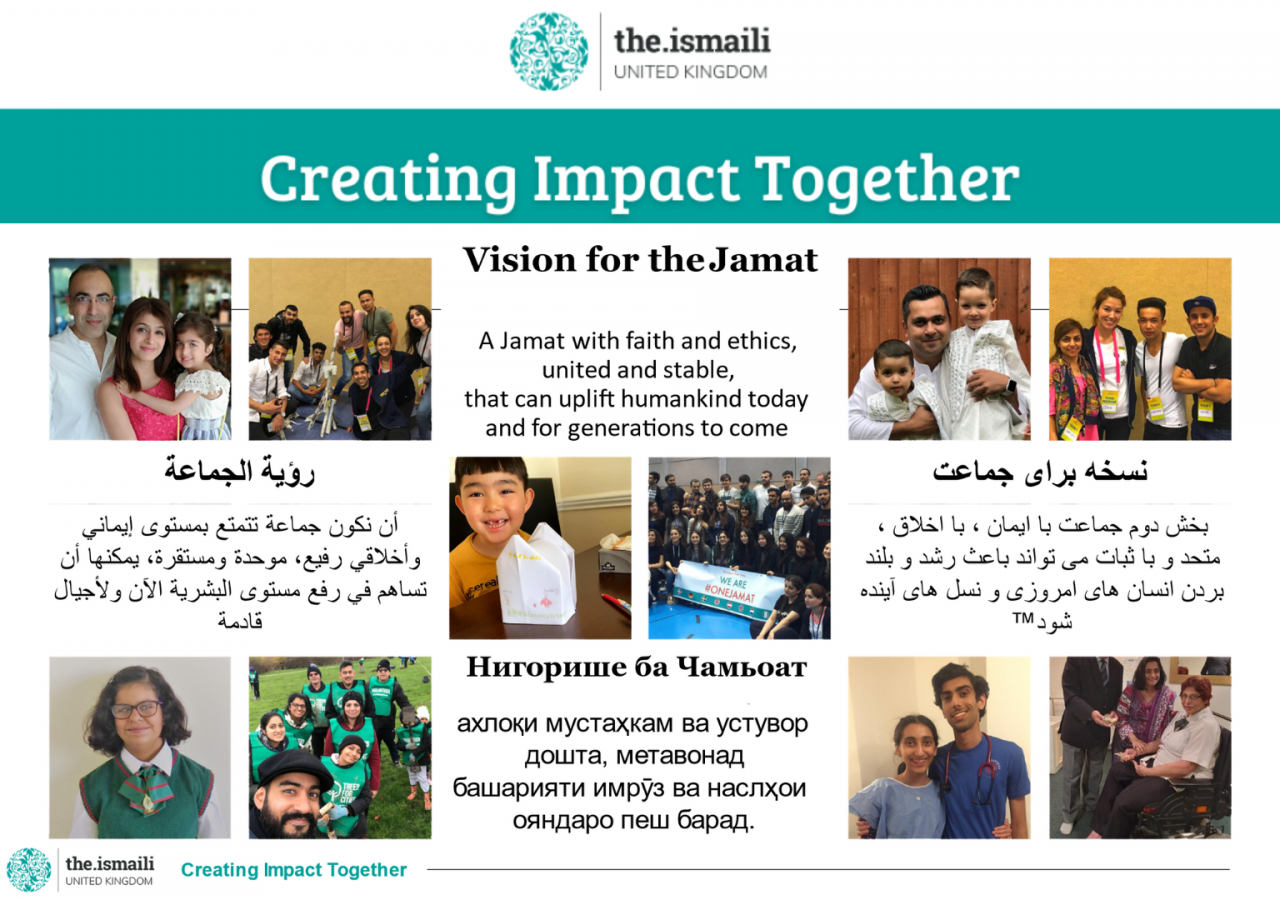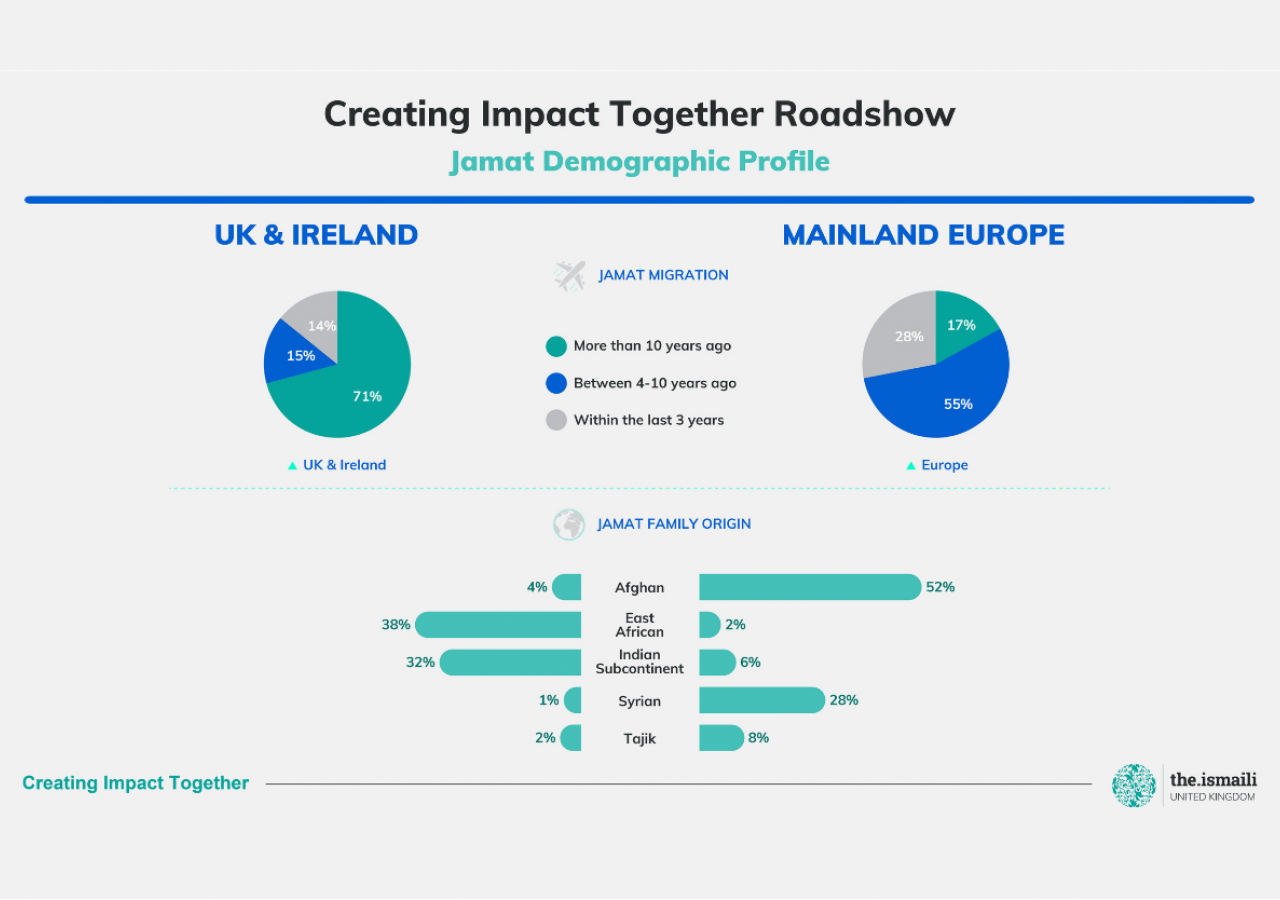Less than a year since our term of office started, the Jamati institutions in the UK would like to share with the Jamat our thinking, our work and how we understand the vision of Mawlana Hazar Imam for our Jamat. We have chosen the theme of ‘Creating Impact Together’ this term and we hope to engage in a dialogue with you about this. Please see dates and times below for our in person and online schedule.
All members of the Jamat including multi-faith family are welcome to participate.
It is our hope that during the roadshows we can spend time in dialogue and discussion. We have published a selection of questions received so far below, including a brief summary of our response.
If you have any thoughts of anything you would like us to address in the roadshows please share it via this form.
If you have attended a roadshow and would like to share your feedback, you can do so by filling this form.
Please note: all in-person roadshows will commence after Jamati ceremonies. All Zoom events will begin at 8.30PM.
| Dates | Location |
|---|---|
|
Friday 21 July |
Leicester |
FAQs
Please find below a selection of questions raised during the Creating Impact Together Roadshows. This is not intended as a comprehensive record of the questions and their responses, but rather a snapshot of the dialogue that we would like to share with the Jamat.
Jamati Volunteering
Why are there still barriers to serve for some young people? What are national leaders doing about this?
- We are sorry to hear that there are Jamati members who feel that there are barriers to them coming forward to serve.
- We invite jamati members to come forward and give us another chance to identify a suitable role.
- We humbly ask the Jamat for patience in case an appropriate role or project is not immediately available that makes the most of your skills.
How are TKN opportunities identified and selected?
- Matching is based on a request from the institution and your profile information. Interviews are then conducted before a selection is made.
- Feedback is provided to all candidates in a timely manner; where appropriate, we might suggest other opportunities for service to the unsuccessful candidates..
What training is provided to leaders?
- We offer various trainings (D&I, MHFA, etc.) and are developing more leadership development programs.
- At a global level work is being done to articulate, define and cultivate leadership competencies including agility, creativity, risk assessment and strategic planning among others.
- We recognise there is more needed here to ensure there is consistency across leadership in terms of values, behaviors and expertise.
Institutional Activity
What does a Jamatkhana 2.0 look like?
- We would like our spaces to be inclusive, welcoming and well-equipped for our many demographics. This may include space for embracing community, artistic, cultural and sporting endeavors. Our spaces should be spaces where Ismailis and non-Ismailis can come together to connect, engage, learn together. We recognise this is aspirational – it is a long-term vision to develop a footprint across the UK jurisdiction with hub Jamatkhanas that represent our Ismaili identity.
What does the concept of “One Jamat” mean and is it the appropriate terminology?
- Saying that we are One Jamat does not mean that we are all the same, but that a part of our identity is shared and that we are greater than the sum of our different parts.
- We use it as a descriptive term, however some may understand it as a feeling – a feeling of belonging to a global community.
- Integral to this vision of togetherness is inclusivity and sense of belonging: irrespective of gender, needs, cultural tradition, neurodiversity or other diversity characteristics.
We are seeing an increase in multi-faith families in the Jamat – how are we ensuring inclusivity?
- Following Mawlana Hazar Imam’s example, we should accord love, time and respect to our multi-faith family members; accordingly, steps have been taken and continue to be taken to evolve our policies to better heed the needs and preferences of multi-faith families. For instance, Baitul Ilm is now an option for children who have not had the Bayah, providing both parents/ carers formally consent.
- It is important to remember, however, that the prayer hall during times of prayer continues to be a space reserved for Ismailis – who have pledged their allegiance, or bay’a to the hereditary Ismaili Imam-of-the-Time – such that the space offers the privacy and intimacy to cultivate their relationship with their Imam.
- Outside of formal prayers, the IsmailI Centres and other jamatkhana buildings seek to welcome members of wider society for educational, cultural, and social programmes.
In our Jamat there is often an allegation of nepotism – is this a fair allegation?
- While nepotism may have played a role in the past, with our growing volunteer base (nearly 3,000!), it's likely far less prevalent now.
- However, we acknowledge that our volunteer selection process can be improved such that we ensure a merit based, unbiased approach. Our systems are not quite where we would like them to be, however, we are committed to professionalism and attracting new volunteers.
- If you're interested in volunteering, please contact us by emailing [email protected].
What are the institutions doing to provide care for me as I get older, and help me get to JK?
- The institutions are limited in both human and financial resources and we must prioritise those who are most in need. We offer support in crisis situations, and we aim to help those families who have a genuine need to improve their quality of life in a sustainable and multi-generational way such that going forward there can be a greater element of self-reliance.
- We encourage all members of the Jamat to support each other and to plan for the future years, such that they have robust arrangements for their needs. Those members of the Jamat who would like guidance on this should please reach out through Accessline which will be launching soon.
What is being done to support those in the Jamat suffering with a mental health condition?
- The most important thing we are doing in this regard is to train all our front-line volunteers and leaders on how to behave in such a way that individuals who are suffering from mental ill health do not feel isolated or misunderstood. We equip them with the knowledge to provide initial support and connect individuals with mental health professionals. This training includes workshops led by Jamat mental health specialists and certified Mental Health First Aid England programmes.
- We encourage the Jamat to take advantage of national awareness days, social media content, and available workshops to educate themselves on how to build mental health resilience in themselves and those around them.
You said in the roadshows that you welcome feedback; how can we give you this feedback or any ideas that we may have?
- Submit questions you would like to be addressed at a particular roadshow here and your roadshow-related feedback here.
- More generally speaking, Jamati members can speak with local leadership or reach out to the National Council Secretariat at [email protected]. We are open to constructive feedback: we ask that this is shared respectfully.












